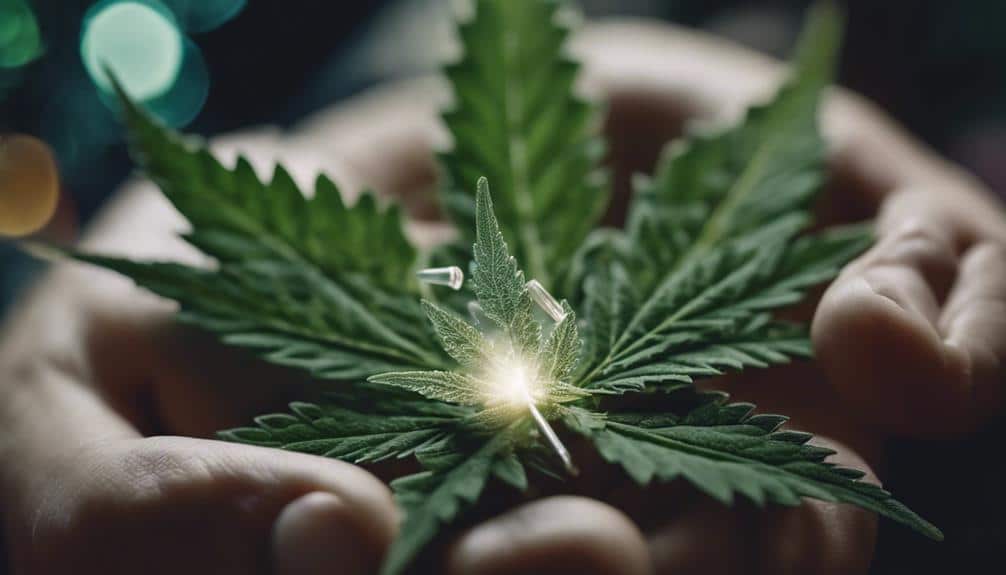Imagine standing in a lush field of cannabis, the air laden with its unique, earthy aroma. You’ve likely heard the buzz about cannabis’s potential in holistic medicine, but you might question the validity of these claims.
Table of Contents
Isn’t it time to separate fact from fiction? As we delve into cannabis’s role in natural, whole-body health, we’ll discuss its therapeutic properties, its impact on pain and anxiety, and its potential for treating neurological disorders.
Teetering on the edge of this intriguing journey, aren’t you eager to discover what truths you might unearth?
A Primer on Holistic Medicine

To fully comprehend the role of cannabis in holistic medicine, it’s essential first to understand what holistic medicine entails. At its core, holistic medicine is about viewing and treating an individual as a whole entity. It doesn’t focus solely on illness symptoms; instead, it integrates wellness practices to promote overall health and prevent disease.
The benefits of a holistic approach are numerous. You’re not just treating an ailment; you’re enhancing your body’s natural ability to heal itself. It’s a proactive approach that promotes health and wellness rather than merely reacting to disease. It underscores the connection between mind, body, and spirit with an aim to achieve optimal well-being where everything functions at its best.
So how do you make this happen? It involves lifestyle choices such as eating healthily, exercising regularly, getting sufficient sleep, managing stress, and avoiding harmful habits. It’s about acknowledging that your emotional, mental, and spiritual health are just as crucial as your physical health. Incorporating wellness practices into your daily routine can have profound effects on your overall health. This is where holistic medicine excels, and this is where cannabis comes into the picture, as we’ll see in the next section.
The Healing Properties of Cannabis
While adopting a holistic lifestyle, it’s vital to understand the therapeutic properties of cannabis because it offers a range of benefits for mind and body health. The antioxidant properties of cannabis are key to its therapeutic profile. These antioxidants combat oxidative stress—a significant factor in many chronic diseases—by neutralizing harmful free radicals in your body. This may help protect against ailments ranging from heart disease to cancer, thereby boosting your overall wellness.
The anti-inflammatory effects of cannabis are another notable attribute. Inflammation is a natural immune response; however, when it becomes chronic, it can lead to serious health issues. Cannabis helps reduce this inflammation, promoting healing and reducing the risk of certain diseases.
Moreover, cannabis promotes homeostasis—a state of balance within your body. It interacts with the endocannabinoid system—a complex cell-signaling system that plays a role in regulating various functions and processes such as mood, memory, and sleep.
Cannabis for Pain Management and Anxiety Relief

Building on these therapeutic properties, it’s worth noting how cannabis plays a significant role in managing pain and anxiety. With the global momentum of cannabis legalization, there’s an increased focus on its potential benefits, particularly in holistic medicine. Let’s delve deeper and analyze how it can serve you.
- Pain Management: Cannabis, especially certain strains, has shown significant promise in reducing chronic pain. It’s believed to interrupt neural pathways, disrupting pain signals to the brain.
- Anxiety Reduction: Studies suggest that cannabis can help alleviate anxiety symptoms. Its calming effects can induce relaxation and improve your overall mental health.
- Sleep Improvement: By managing pain and anxiety, cannabis can help enhance sleep quality—a crucial factor for overall wellness.
- Enhanced Quality of Life: When used responsibly and under proper guidance, cannabis can improve your quality of life by effectively managing pain and anxiety.
Cannabis and Neurological Disorders
Broadening our understanding of cannabis’s therapeutic capabilities, research indicates its potential efficacy in treating various neurological disorders. You might be surprised to learn about the neuroprotective effects of cannabis—it all comes down to the influence of cannabinoid receptors in our nervous system.
Cannabinoids—compounds found in cannabis—interact with the body’s endocannabinoid system. This interaction influences neurological functions potentially offering therapeutic benefits for disorders like multiple sclerosis, Parkinson’s disease, and epilepsy.
Researchers have found evidence that cannabinoids—particularly CBD (Cannabidiol) and THC (Tetrahydrocannabinol)—can help regulate neurological processes linked to these disorders. They may prevent neuron damage, reduce inflammation, and modulate neurotransmitter activity. This is where the neuroprotective aspect of cannabis comes into play. By shielding neurons from damage, cannabis could slow the progression of these disorders.
Moreover, the influence of cannabinoid receptors should not be underestimated. Cannabinoid receptors—primarily CB1 and CB2—are found throughout the body but are particularly dense in the brain. They play a crucial role in regulating our nervous system, and when cannabinoids bind to these receptors, they can alter cellular functions and provide potential relief for neurological symptoms.
In serving others, it’s essential to consider all therapeutic options. Cannabis might just be a valuable tool in our neurological health toolkit.
Dispelling Cannabis Misconceptions

Misconceptions about cannabis abound; however, it’s crucial to separate myth from fact to truly understand its potential in holistic medicine. Here are four common misconceptions that need debunking:
- Cannabis is addictive: While cannabis can be habit-forming, it’s not as addictive as substances like alcohol or nicotine. It’s important to use responsibly—especially when addressing medicinal needs.
- Cannabis legality means it’s safe for everyone: This is not true. Just like any medicine, cannabis isn’t suitable for everyone and can have side effects—especially when used recreationally. Always consult with a medical professional before use.
- Recreational versus medicinal use is different: This statement couldn’t be more accurate. Medicinal cannabis often involves specific strains with controlled levels of THC and CBD for therapeutic use, while recreational cannabis can vary widely.
- Not all cannabis gets you high: Not all cannabis is psychoactive. CBD, a primary compound in cannabis, doesn’t induce a ‘high’.
Conclusion
In conclusion, you’ve seen how cannabis plays a significant role in holistic medicine. Its therapeutic properties are beneficial for pain management and neurological disorders. But remember—it’s not all smoke and mirrors. Misconceptions need debunking for its full potential to be realized. As part of the holistic wellness toolkit, cannabis could be just what the doctor ordered—offering a natural, effective remedy for numerous health challenges.
We invite you to delve deeper into this subject with us at Cannabis Docs of Delaware. We’re always eager to share our knowledge and help you understand the potential benefits of cannabis in holistic medicine. Whether you’re seeking more insight or considering it as a treatment option—we’re here for you. Why not pay us a visit or give us a call? Let’s continue exploring and understanding this powerful plant together.

